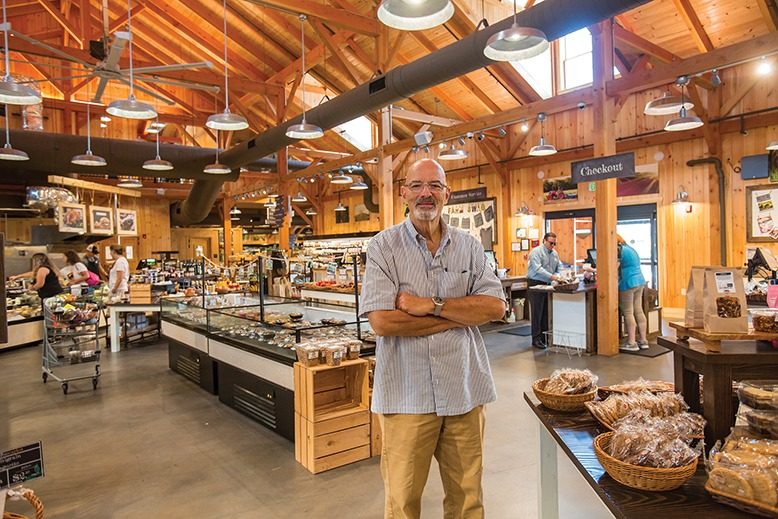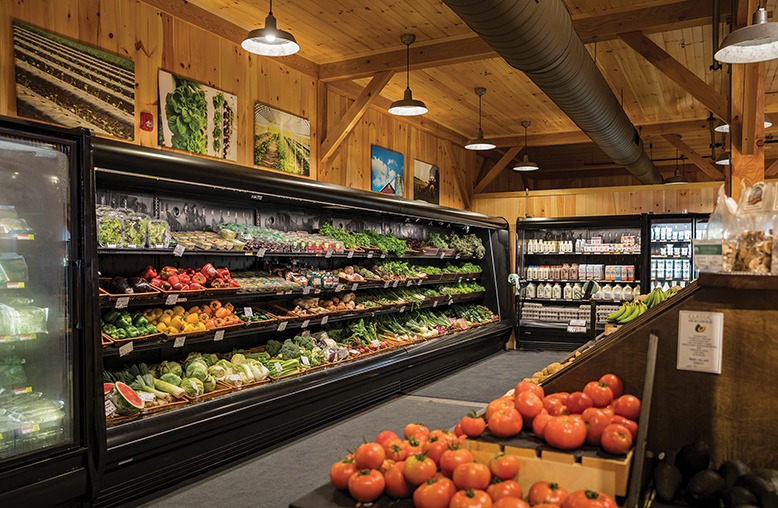
There are plenty of farm stands in Hunterdon County, but none quite like this. In fact, the 25,000-square-foot Profeta Farms market is more grocery than farm stand. It’s also one of the first groceries in the country that sells organic produce, meat, dairy, ice cream, bread, prepared meals and dozens of other items raised or grown exclusively on-site—or made with the farm’s own ingredients.
To its owners, this is the farming of the future. “What we wanted to do was create an alternative, a template, a lab experiment to see if Americans would want to revolutionize the way they eat, and you can’t do that with a little 2-by-4 farm stand,” says Paul Profeta, who co-founded the 1,200-acre Profeta Farms in 2012 with his wife, Joanne Malino. “We had to make it big enough so people had the variety. I wanted to be able to say, ‘You can buy all your food here.’”
While local and organic offerings are showing up in more aisles of conventional grocery stores, Profeta is betting people will be encouraged to shop for organic food if it’s all under one roof and prepared in inventive ways. It also helps if, on the way into the store, they can see the fields where everything is grown—organically, of course.
With its barnlike exterior, the Profeta Farms market pays homage to the agricultural history of the area while providing a fundamentally new experience inside. Within the airy, sunshine-filled space—with its giant ceiling fan, skylights and wooden rafters—shoppers browse wooden crates and barrels of produce raised in the fields, in one of several hoop-style greenhouses, or in the Profeta Farms hydroponic growing facility.

Fresh organic produce at Profeta Farms. Photo by John Bessler
On a visit this past summer, I procured freshly picked seedless yellow watermelons, still warm from the field; heirloom tomatoes spanning the color spectrum; fresh blueberries and strawberries bursting with flavor; pungent garlic scapes; and colossal summer squash.
A refrigerated display beckoned with leafy greens, succulent fruits and impossibly large vegetables. One colorful produce case offered chili peppers (habañero, Fresno, and red and green jalapeño), billowing green and red bell peppers, bok choy, Napa cabbage frilly as Chantilly lace, bulbous ginger roots and umbrella-like portobello mushrooms.
Marbled New York strip and filet mignon, thick-cut pork loin, and plump chicken breasts glistened in the butchery case. House-cured and composed sausages were arrayed in all colors and varieties. Whole sheets of pork belly spun on a rotisserie like passengers on a Ferris wheel. The market also displayed responsibly raised seafood—catfish, tilefish, shrimp, scallops and more—shipped from partner group Samuels and Son, a Philadelphia-based seafood wholesaler.
Profeta says customers who take home a farm-grown cucumber or a carton of free-range eggs can taste the difference that organic farming makes.
“One of the knocks on organic food, which is counterintuitive: People think if they’re eating organic food it’s going to be bland, lifeless, tasteless,” Profeta says. “In fact, it’s the opposite. The food explodes with flavor.”
Profeta Farms adds another twist to the traditional farm stand. Half of the market’s 10,000 square feet of shelf space is reserved for organic prepared meals and foods.

The market is also stocked with prepared foods, baked goods and plants. Photos by John Bessler
A glass counter displays individual take-away dishes made by a team of chefs. I spied eggplant rollatini made from Profeta Farms produce and in-house mozzarella. Tandoori chicken was packaged on a bed of couscous with lime and onion. There were several grain bowls, including cuts of seared top sirloin atop rice with charred brussels sprouts, and a fat slab of umami-rich pork belly on quinoa. Also tempting: twice-baked sweet potatoes with a maple glaze, or vegan-potato herb salad with parsley, dill and tarragon.
Customers can chat with Profeta Farms personnel scooping ice cream or shaping dough made from farm-grown heritage grains into batards, challah and pretzels. You can order pepperoni pizza by the slice or the pie, or watch as the sandwich maker adds thick bacon slices, charred at the edges, to his latest creation.
Then there’s the pastry counter; it’s irresistible. Fresh fruit pies (apple, cherry, blueberry, coconut cream and more), beautifully composed cakes, lemon tart with meringue dollops, and flaky pain au chocolat all await.
Outside, depending on the season, a food truck sells everything from organic pumpkin-spice lattes and cinnamon hot chocolate with bruléed marshmallows to fried chicken sandwiches and pork belly banh mi.
[RELATED: How Supermarkets Are Satisfying Changing Tastes]
All of this, of course, comes at a cost to the consumer. For instance, organic yellow onions sell for $1.50 per pound at Profeta Farms, while conventional yellow onions at ShopRite are marked at $1.29 per pound. A pasta pesto salad runs $9 per pound in Profeta’s packaged-food stalls; a similar pasta with pesto goes for $6.99 per pound at the Kings up the road in Whitehouse Station. Whole watermelons are $8.99 at Profeta Farms and $4.99—$6.99 at Wegmans in Bridgewater. A bunch of organic carrots grown in Readington soil is priced at $3 in the Profeta Farms store; organic carrots from California are $1.99 at Wegmans.
There are several reasons for the higher prices. It takes longer to raise food organically, without the use of pesticides, herbicides and growth hormones. What’s more, organic farms like Profeta rely on biodiverse soil, which means rotating crops, a requirement of organic certification. That regenerates the soil by increasing its fertility and reducing erosion, but it’s time and labor intensive. Also, if there’s a problem, like an infestation of Japanese beetles, instead of bombing the area with pesticides as a conventional farmer would, Profeta says he has to deploy 10 workers to pick them off by hand.
Still, at Profeta Farms there is optimism that the combination of fresh, organic produce and prepared foods will entice customers—and sustain the business model.
“The future of New Jersey farming is exactly this—direct-to-consumer as much as possible,” says Perry Griffin, farm operations manager at Profeta Farms. “That helps you amortize the expenses of operating in a place like New Jersey, where land is expensive and there are a lot of other farms operating already.”
This systemic change in food marketing has been building for years, says Megan Muehlbauer, county agent for the Rutgers’ Hunterdon County agriculture extension.
“Agriculture in northern New Jersey has really exploded in terms of direct-to-market sales,” she says. “I think the [grocery store model] works really well. Consumers love it. It’s a one-stop-shop.” If people see value in sustainably raised food, she adds, “they’ll be willing to invest in it.”
Profeta, a business school graduate, may have been better prepared to invest in such a large operation than most farmers. The success of his national real estate company, which he still runs, yielded the financial resources to pay for farm equipment, the construction of the market, and a staff of more than 100.
His model might but not work for everyone, but Profeta is doing what he can to spread the word on organics. Profeta Farms hosts tours and kids’ events every Saturday at 1 pm, where the value of carefully raised food is shared with a new generation in a fun, educational setting. The goal is nothing short of advancing the sustainable-food revolution, Profeta says.
“What I’m asking Americans to do, and I’m starting in a small section of New Jersey, is analyze what you’re eating, the effect it’s having on your life and health,” Profeta says. “Think about it. Do you want to change that?”
